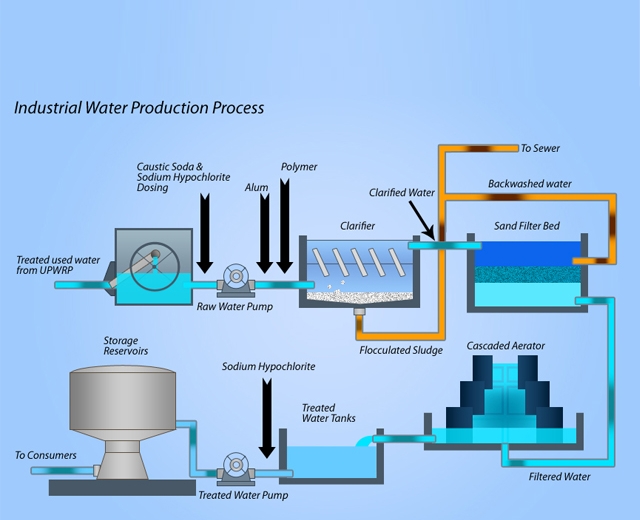Why a Water Purification System Is Essential for Tidy, Safe Water
Access to clean, secure water is a basic human right and a cornerstone of public health. The existence of hazardous contaminants such as virus, heavy metals, and chemical toxins in our water supply raises serious problems about health and wellness and health. A water filtration system stands as an essential service to reduce these threats, ensuring that neighborhoods and people can access secure alcohol consumption water. Recognizing the intricacies of these systems and their different methods is vital, especially as we think about the effects for health and wellness results and environmental sustainability in our every day lives.
Value of Clean Water
Access to clean water is a basic necessity for human health and health. Polluted water can lead to serious health and wellness problems, consisting of intestinal ailments, cholera, and dysentery, specifically in susceptible populations such as youngsters and the senior.
In addition, clean water is crucial for sanitation and hygiene practices, which are crucial in stopping the spread of infectious diseases. Sufficient water system sustains correct cleanliness facilities, promoting a healthier atmosphere. In addition, accessibility to secure water influences socioeconomic factors, as it makes it possible for areas to take part in industrial and farming activities, eventually adding to economic development.
In lots of regions, the absence of clean water exacerbates hardship and inequality, further hindering progress towards sustainable growth objectives. Therefore, making certain accessibility to tidy water is not only a public wellness essential yet also a cornerstone for social equity and economic development. Initiatives to enhance water quality and facilities have significant benefits, fostering healthier areas and improving top quality of life.

Common Contaminants in Water
Making certain the availability of clean water is undermined by numerous pollutants that can compromise its security and quality. The visibility of virus, such as microorganisms, bloodsuckers, and viruses, poses substantial health and wellness threats, especially in areas lacking appropriate cleanliness. These bacteria can result in waterborne illness, leading to serious disease and even death.
Chemical impurities likewise present a crucial worry. Heavy steels, including arsenic, mercury, and lead, usually go into water products with industrial discharges or corroded pipes. These materials can collect in the body gradually, bring about long-term health and wellness concerns such as neurological damages and developmental conditions.
Additionally, farming drainage presents pesticides and fertilizers into water supply, which can interfere with environments and adversely effect human wellness. Nitrates, commonly located in plant foods, can trigger serious conditions like methemoglobinemia, particularly in infants.
Benefits of Water Purification Solutions
Acknowledging the critical demand for secure alcohol consumption water, water filtration systems use a myriad of advantages that improve public health and ecological sustainability. Mostly, these systems successfully get rid of unsafe impurities, including bacteria, infections, heavy metals, and chemicals, making sure that the water eaten is free from toxins and virus. This decrease in contaminants dramatically lowers the threat of waterborne diseases, promoting total area wellness.
In addition to health and wellness advantages, water filtration systems add to ecological sustainability by lowering dependence on bottled water, which typically generates extreme plastic waste. By using a filtration system, houses can reduce their carbon impact and add to a more sustainable community. In addition, these systems can improve the taste and smell of water, making it a lot more palatable for everyday consumption.

Different Kinds Of Purification Approaches

One usual technique is reverse osmosis, which makes use of a semi-permeable membrane layer to different water from liquified solids and contaminants. This process properly reduces impurities, consisting of hefty steels and chemicals. Another widely used technique is ultraviolet (UV) disinfection, which employs UV light to reduce the effects of germs and viruses, rendering them harmless without making use of chemicals.
Triggered carbon filtration is one more popular approach, utilizing carbon to adsorb organic compounds, chlorine, and undesirable smells, boosting taste and odor top quality. Purification, a procedure that includes boiling water and condensing the vapor, effectively removes impurities and minerals yet may call for more power compared to other methods.
Ion exchange is typically utilized to soften water by replacing calcium and magnesium ions with salt or potassium ions. Each method has its benefits and restrictions, making it vital to understand their functionalities and performance in attending to particular water quality issues - Water Purification System. Ultimately, picking the suitable filtration method is essential for ensuring tidy and risk-free alcohol consumption water
Selecting the Right System
Selecting a proper water filtration system requires cautious consideration of different factors, including the particular contaminants existing in the water supply, the quantity of water required, and the preferred purification technique. It is crucial to conduct a water top quality examination site link to identify pollutants such as microorganisms, heavy metals, or chemical toxins. This details will certainly guide you in selecting a system that efficiently targets those specific contaminations.
Following, examine your house's everyday water intake to figure out the system's ability. Equipments are readily available in various dimensions, from point-of-use filters for drinking water to whole-house systems that detoxify all water entering your home.
Moreover, think about the filtration approach that ideal fits your needs. For instance, reverse osmosis is very reliable for eliminating a vast variety of contaminants, while UV filtration is superb for getting rid of microbes.
Conclusion
Finally, the application of water filtration systems is critical for ensuring accessibility to tidy and secure water. These systems successfully get rid of unsafe impurities, therefore lowering the threat of waterborne illness and improving public health and wellness. They add to ecological sustainability by lessening reliance on bottled water. By comprehending the value of clean water and the benefits of numerous purification methods, neighborhoods can make educated decisions to guard their wellness and advertise socioeconomic security.
Acknowledging the critical demand for secure alcohol consumption water, water purification systems use a myriad of benefits that improve public wellness and environmental sustainability.In enhancement to health advantages, water purification systems contribute to environmental sustainability by reducing reliance on bottled water, which often produces too much plastic waste. Eventually, the adoption of water purification systems is an aggressive step toward making sure clean, about his risk-free water for future generations while guarding public health and the atmosphere.
Selecting an appropriate water purification system needs mindful consideration of different factors, including the details contaminants present in the water supply, the volume of water needed, and the preferred filtration method.In final thought, the application of water purification systems is crucial for guaranteeing accessibility to clean and risk-free water.